#Seerut K Chawla
Explore tagged Tumblr posts
Photo
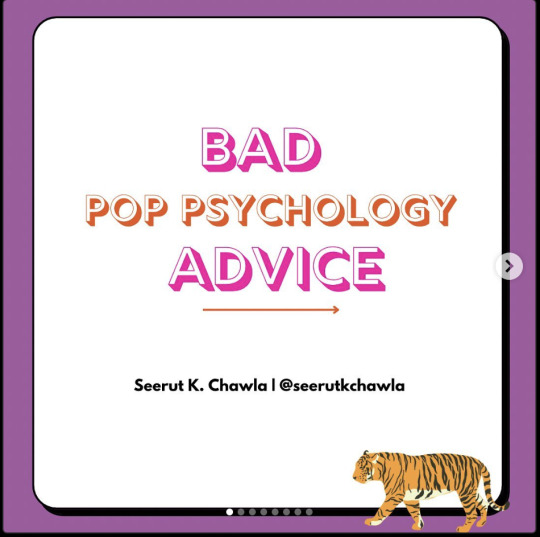
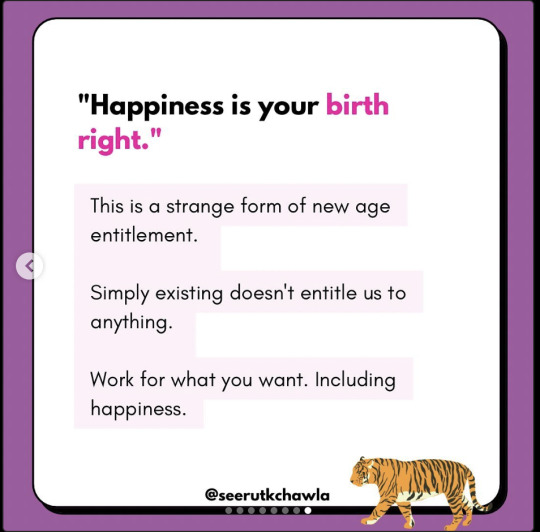



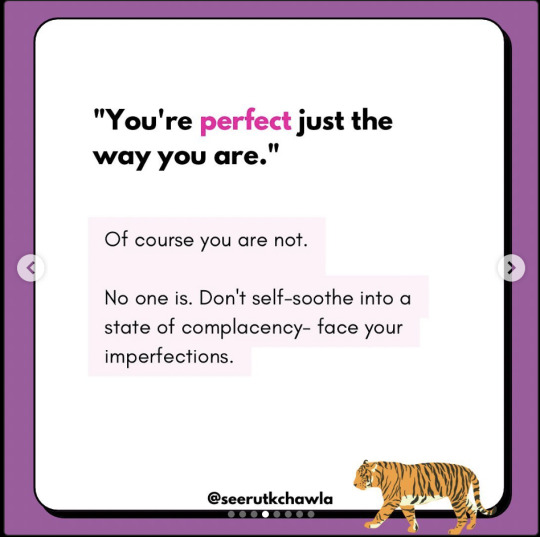


I’m as interested in learning about psychology and mental health as the next dysfunctional, unhappy person but too often I see dodgy advice and overly simplistic maxims repeated on social media.
Seerut K Chawla on Instagram is a breath of fresh air since she takes a no nonsense approach with critical thinking and healthy skepticism towards the infantilising trends in “Instagram DIY therapy”. Here’s an example of her content.
A trained psychotherapist, Dr. Chawla looks at the individual and society instead of just pandering to the self absorbed seeker. She can be kinda crude at times in her language, but she makes thought provoking points and makes the reader examine themselves and others.
You can check her out here https://www.instagram.com/seerutkchawla/.
#seerut k chawla#psychotherapy#mental health#pop psychology#psychology#quotes#growth mindset#individualism#tiger#bad advice#food for thought#purple#graphic design#instagram#instagram culture#wellness#critical thinking#skepticism#wisdom
122 notes
·
View notes
Note
Seerut K. Chawla is a terf, right? Or am I being unfairly judgey?
Yep. She's said many explicitly TERF talking points many times before and then complained about being "cancelled" for it every time.
7 notes
·
View notes
Text
Apparently I've managed to attract a bunch of triggered, fragile superstitionists.
Must be doing something right.
In a way your haters are your biggest fans. Only someone who is utterly convinced of your power & effectiveness would dedicate themselves to attacking you. -- Seerut K. Chawla
12 notes
·
View notes
Text
Image ID: edited screenshot. Original image was an Instagram post by Seerut K. Chawla @seerutkchawla. The title says "Pop Psychology is [blank] Psychology." Each bullet point is edited obviously, such that where the word "not" once was, there is just a blank white space. The bullet points now read: "Everyone you dislike is a narcissist." "Every unpleasant experience is trauma." "Having needs does make you codependent." "Disagreement is gaslighting." "Conflict is abuse." "Taking offense is being triggered." "Everything does need to be normalized." " Speaking like an HR memo is self-awareness."
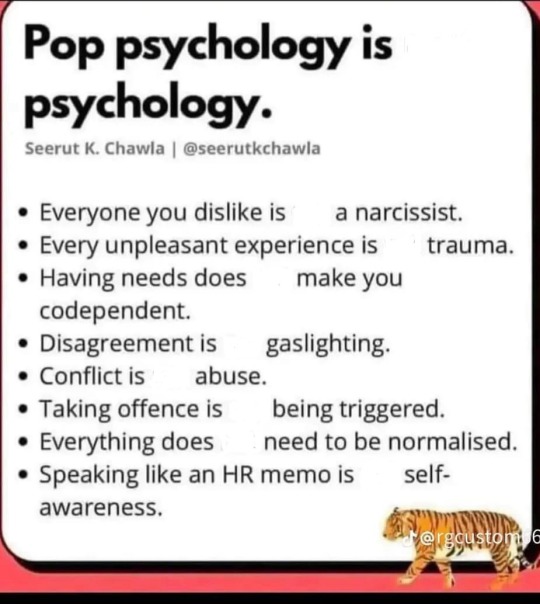
3K notes
·
View notes
Text
Not to be the guy who talks about the podcasts he listens to, but one of them made me think today. And I am once again using Tumblr to sort though my thoughts.
So I was listening to I Weigh, which is a podcast about mental health, hosted by Jameela Jamil. Interviewing Seerut K Chawla, about many topics really, but most prominently about how we talk about mental health. How it might not be too helpful despite trying to be and pop psychology.
One thing they discussed is how some terms have been watered down to the point where it is hard to even talk about them. How some people have difficulty speaking about their trauma because it is so big, while another who uses the same term talks about not getting pocket money from their parents. Something that seems so small in comparison to growing up in an active war zone.
They also talked about how having bad experiences is not the same as being through trauma. And while that is a valid thing and discussion, I believe a part of the problem about it is how fucking hard it is to get across experiences and how you are really living your life.
I know that I do. It is hard to articulate what my life with the various issues is really like. From the utter embarrasment that is not being able to keep to a shower schedule, because part of it is how to take care of my hair, and even shampoo made for dandruff is hard on my scalp, and then it becomes a issue of scheduling time to do it, I can’t just go shower, it is a THING. It is a commitment while others dob’t even have to think about it.
Sure, I can tell y’all how I cannot go camping in the woods, a thing I actively crave, because having sounds around me when I sleep is so frightening. It is hard to put into words how bothered I am every day by the things that has gone on in my life, how it dogs me. I can say it, but will you even understand? Every mistake, mean comments, the feeling of the hands of five girls pressing me down as they applied makeup on my face last year of 7th grade, the look in my dad’s eyes as he grabbed me from behind and I struck back so hard that he collapsed.
And then there are things like. Sound alarming but it doesn’t feel that way? I sometimes hear a flute in the distance, faint. I know it isn’t real. There is no way that they are in the store at 19.30, and in the forest. I honestly do not believe that I am important enough that a random fluteplayer has been stalking me since I was nine to… what? Mess with me? No, it is an auditory illusion, but saying that sounds scary to people.
All of this I have to articulate to a proffesional, to the point where they understand me, which is a feat of it’s own. How are you going to get sufficent and accurate help? How many of us have not bungled it because while yes you are almost sold in, and then a comment ruins it? Or in the positive case, said a few key phrases that got you the help you needed? You have to preform your need if help to satisfaction and it is exhausting, for BOTH parties. How are you, the person on the recieving end of this going to tell if someones issue is a minor thing about pocket change, or a story about financial abuse with devestating effects? How will you tell if this person wants to do the work that is trying to get mentally healthier, or just have someone that listens to them and coddle their belief that nothing was ever their fault?
Then you add other issues, like location. Do y’all know how few people even have acess to health proffesionals? It is hard to get help here in the sticks. And even in Oslo the public health services are overloaded, been so since before Covid.
So then a lot of us, either in between getting help and realizing we need help try to live our lives because you gotta pay bills and taxes. Maybe the way I cobbled my life together sounds like a nightmare, but like. What am I supposed to do in the meantime?
All of this to say that I partly agree. The way certain terms are washed out is a problem. From accusing people of gaslighting and calling every bad person a narcisist. Hell, I have talked about how dangerous I think it is to spew the rethoric that certain subset of people, including narcisist, cannot get better, because it frees them from being held accountable for their actions. And it makes it hard to communicate when every bad experience is, say, a trauma, instead of saying it was a rough period. However I think what we really need is terminology to communicate accurately and easily how our lives really are. The servere lack is making us turn to these phrases, and as grating as it is, until we have better ways, it is going to stay.
1 note
·
View note
Text
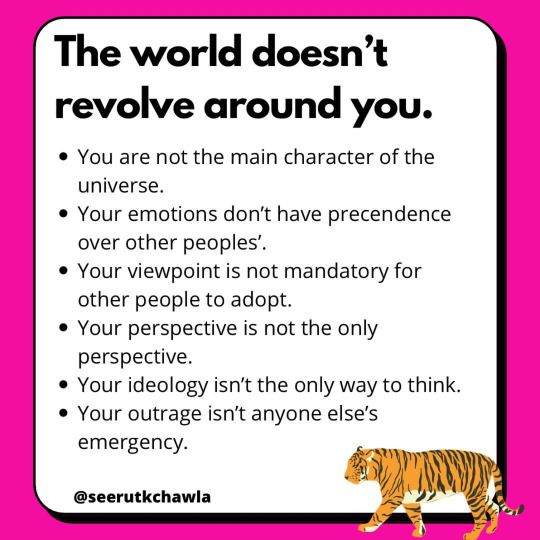
seerutkchawla ~ Instagram
#seerutkchawla#Seerut K Chawla#personal responsibility#responsibility#self awareness#personal growth#maturity#immaturity#welcome to adulthood#egocentric#egotistical#self involved#self obsession#entitlement#infantilism#nihilism#narcissism#selfish#self victimization#victimhood#offended#terminally offended#outrage culture#cancel culture#woke culture#snowflakes#ideological possession#tyranny#authoritarianism#controlling
764 notes
·
View notes
Text
“Maybe you ‘had trauma’ or maybe you WERE wise beyond your years- maybe both.
If all you have is a hammer everything will look like a nail. #inthetrencheswithyou “
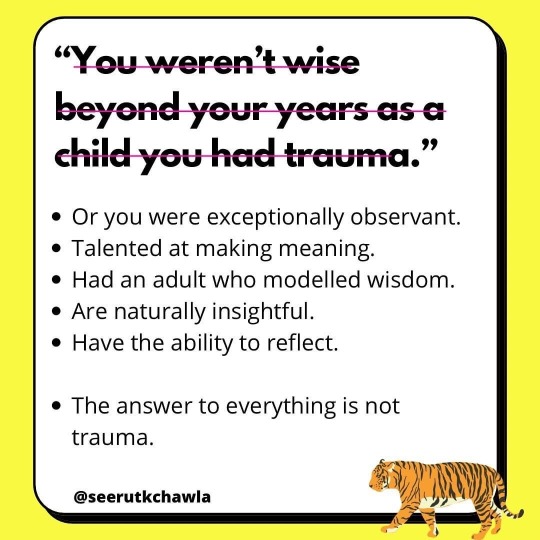
18 notes
·
View notes
Link
I've never heard of this lady but she asked this intriguing question and Twitter's almighty algorithm decided it should grace my timeline and so I couldn't help but read some of the replies.
I'm glad I did because hoo boy.
"What was your woke breaking point?" is the question from this woman, who, by the way, defines herself as a liberal in her Twitter bio
…
As of now there are about 2,000 replies and quote-tweets. Here are 55 of the best, most interesting, and most insane replies (I took the liberty of using screenshots instead of embedding them so this page wouldn't take 7 years to load)
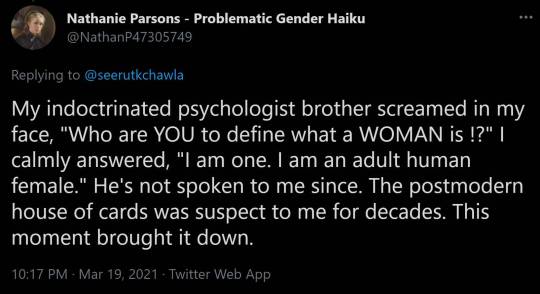
…
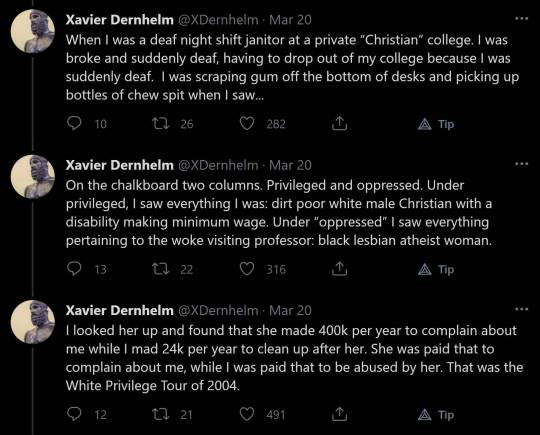
…
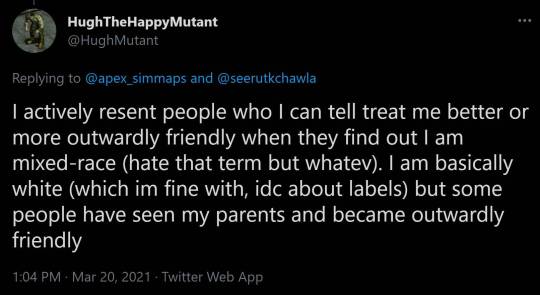
…
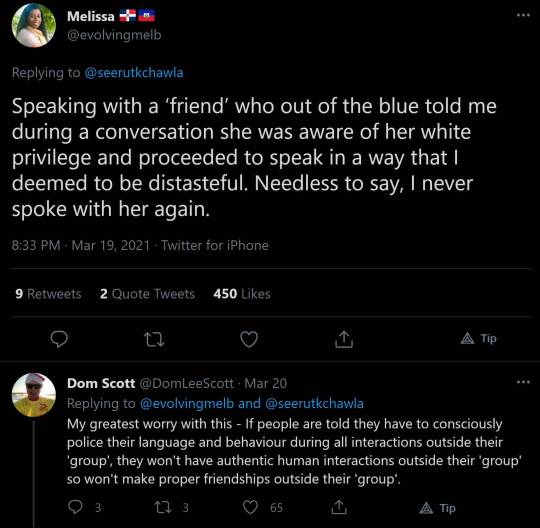
…
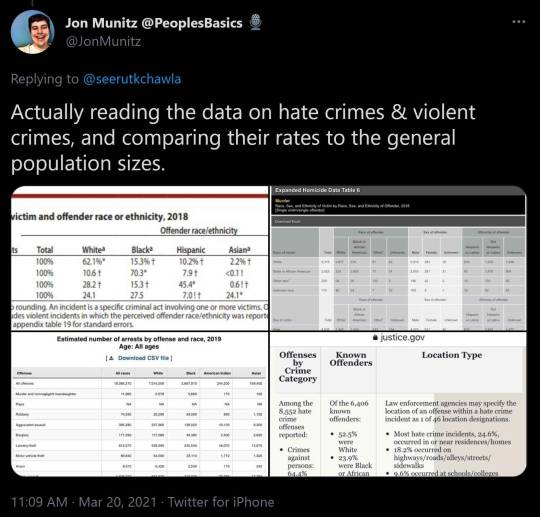
…
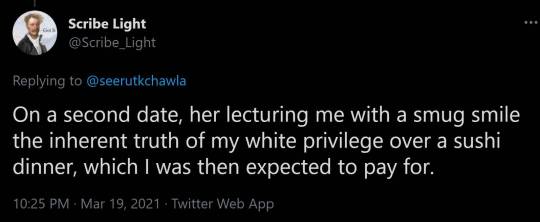
…
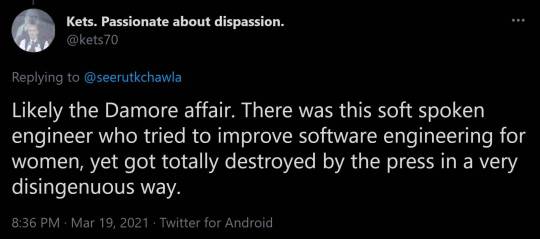
…
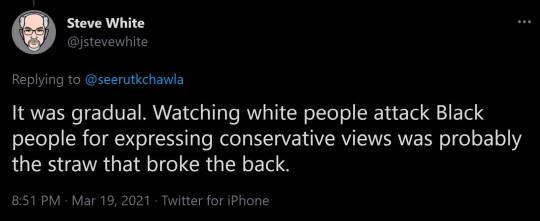
…
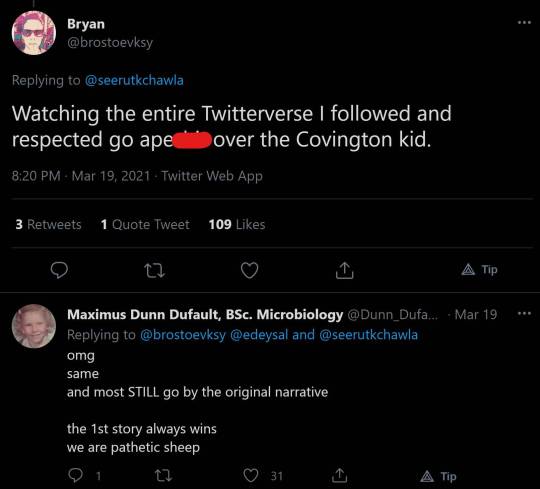
…
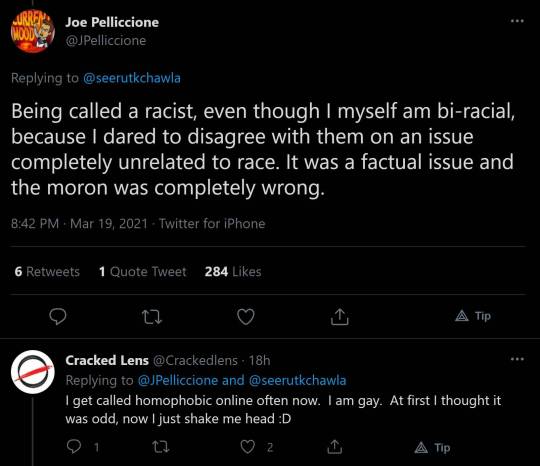
…
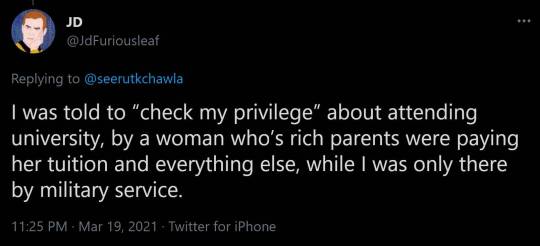
…
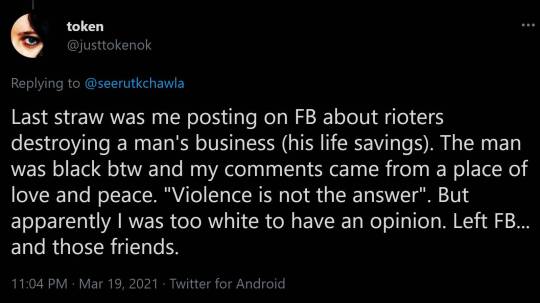
…
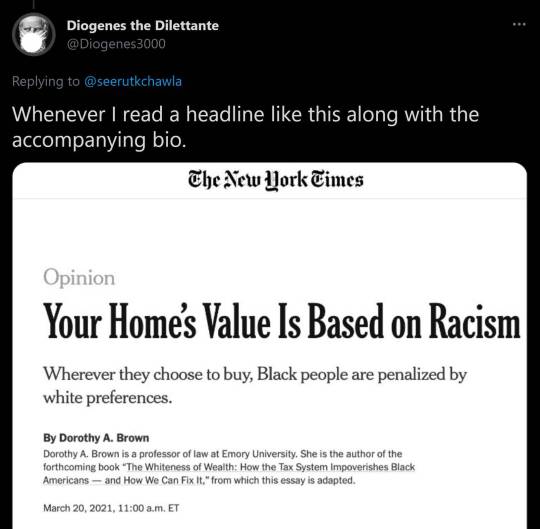
…
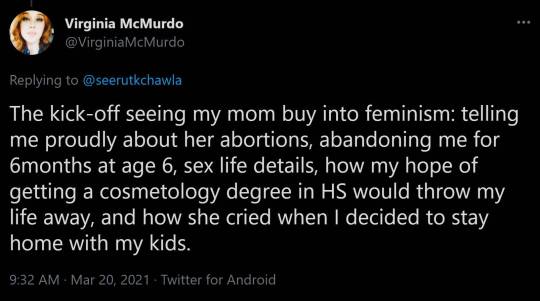
…
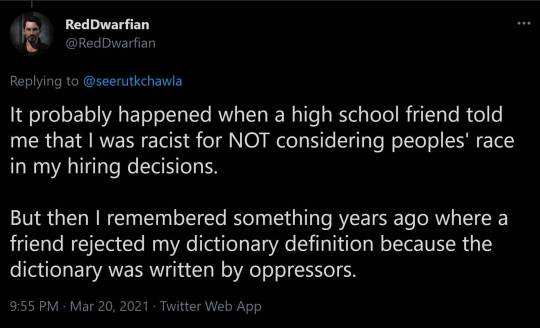
…
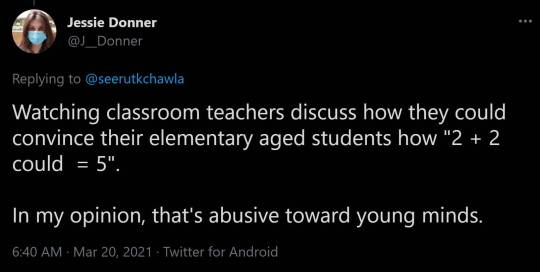
…
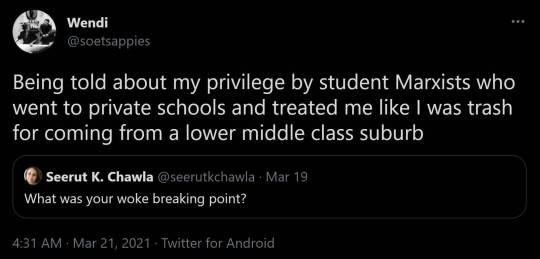
…
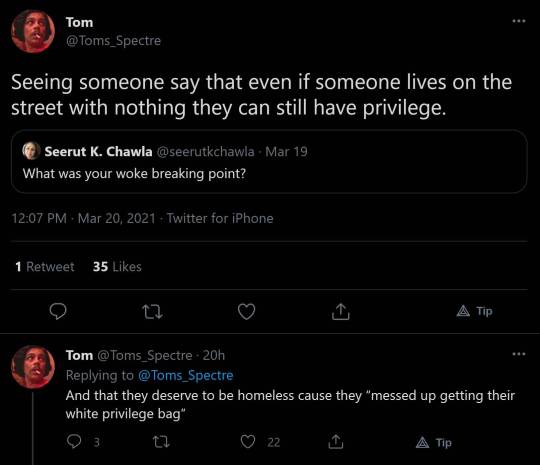
…
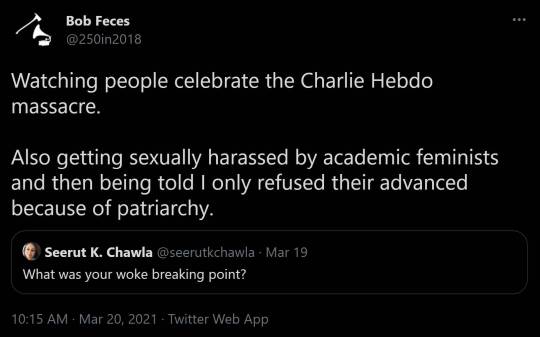
…
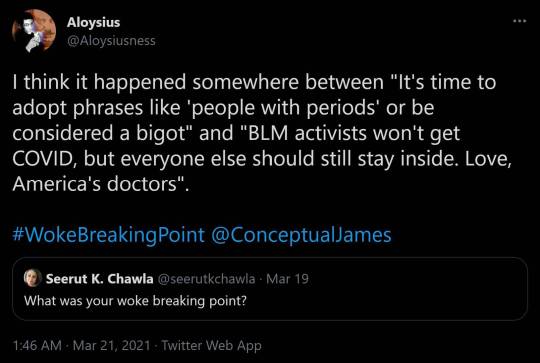
5 notes
·
View notes
Text

"Ultimately, cancel culture has less to do with politics and more to do with character. Decent people don't jump at the chance to publicly shame and destroy others for having an opinion they don't agree with." -- Seerut K Chawla (UK mental health specialist)
#mental health#cancel culture#wokism#covid 19#masks#vaccines#black lives matter#racism#antifa#uk#usa#political correctness
19 notes
·
View notes
Photo

Points to consider from Dr. Seerut Chawla on what it means to be an adult. I like how she counters the tide of infantilisation we see in the modern world with hard hitting statements. As with anything one reads on the internet, her word shouldn’t be accepts as “facts” rather they are another perspective that one may find refreshing.
#seerut k chawla#philosophy#adult life#adulting#adult perspective#maturity#infantilisation#empowerment#start earning#self control#humility#psychotherapy#tiger
2 notes
·
View notes
Text
about me
Bella ✨
Libra Sun
Aries Moon
Capricorn Rising
25 years old💚
eclectic/baby witch
northern hemisphere
future therapist + aspiring author
my favourite things: solitude, nature, being cozy, being in love, sexuality/sensuality, coffee, tea, cannabis, meditation, mindfulness, music, poetry
my hobbies: learning, sleeping, watching Friends and Little House On The Prairie, playing Animal Crossing, researching psychology and neuroscience, writing, blogging, reading, singing, hiking
beliefs & values: agnosticism, mindfulness, nonresistance, patience, humour, pleasure, beauty, vulnerability, generosity, compassion, communication, minimalism
people who inspire me: Jordan B. Peterson, Eckhart Tolle, Thich Nhat Hanh, Osho, Russell Brand, Alan W. Watts, Brené Brown, Melody Beattie, Nedra Glover Tawwab, Sharon Peykar, Annie Kaszina, Sara Kuburic, Seerut K. Chawla, Sonia Sabnis, Maria Sosa, Nicole Addison, Elizabeth Earnshaw, r. h. Sin, Juansen Dizon, Herman Hesse, Marcus Aurelius, Friedrich Nietzsche, Chester Bennington, Marshall Mathers, John Hillstead
practices: herbalism, holistic/naturopathic health + medicine, meditation + mindfulness, yoga, lunar magic, self-love + self-care, cleansing rituals, communion with nature, cannabis use, sound therapy, aromatherapy, massage therapy, bath magic, chakra healing, healing crystals + more!
here is my first formal introduction on this blog in which I share my journey which lead me to discovering witchcraft ✨💛
💗💗💗💗💗
some of my other blogs:
💗💗💗💗💗
embody-love-emanate-light
💗💗💗💗💗
isa-glow-bella-grow
💗💗💗💗💗
bella-wellness-progress
💗💗💗💗💗
isa-reads-bella-books
💗💗💗💗💗
brainstorming-ink
💗💗💗💗💗
2 notes
·
View notes
Photo

“A 'safe space'- when you already live in the safest time & place in the world- is called a ‘comfort zone’.”
-- Seerut K. Chawla
#Seerut Chawla#safe spaces#first world privilege#first world problems#comfort zone#comfort#imaginary oppression#victimhood culture#victimhood#religion is a mental illness
31 notes
·
View notes
Note
Can you tell if someone is actually spreading awareness on social issues or if they’re just band wagoning?
I think the answer is you can sort of tell, but sometimes, the people who are being the loudest on social media are also the people doing the most behind the scenes.
I saw this post the other day from trauma therapist Seerut Chawla (@seerutchawla) that I really liked. I’m not a huge fan of her other opinions, but I think this graphic does a good job outlining some of the differences between performative and genuine allyship.
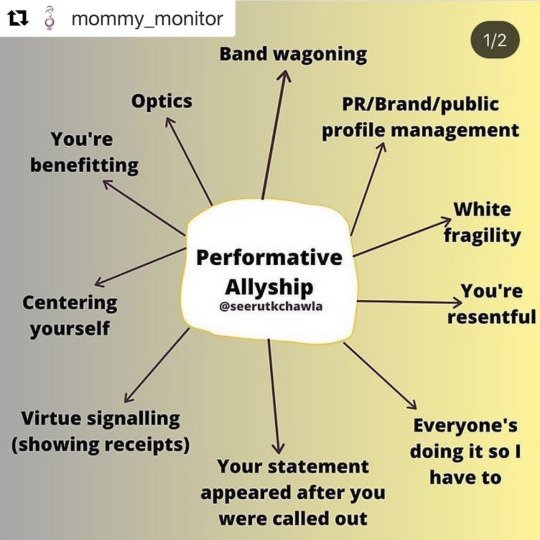
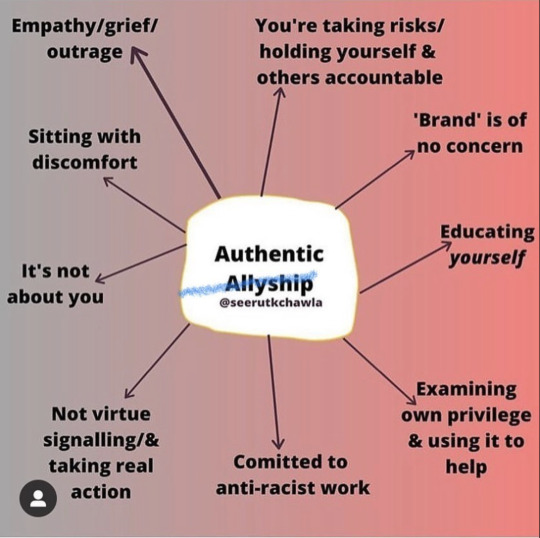
Performative social media posts are frequently simple, express outrage, disbelief, or anger at “the injustice”, avoid acknowledging personal responsibility for systemic issues, and are designed to be met with praise and admiration from people in the poster’s social circle. There is no risk to the individual with performative allyship. It allows people to pat themselves on the back and feel better for “solving the problem” so that they can absolve themselves from the guilt they feel for being part of the problem.
Genuine allyship can involve things like donating money, supporting BIPOC owned businesses, calling out racist behavior in real life as well as online, informing oneself about racism, and changing behaviors without announcing it or seeking praise for it. Genuine allyship often requires sacrifice, whether that’s in terms of money, resources, time, interpersonal relationships, or pride.
Allyship should be something that people do, not something they identify as or a label that they wear. Performative social media posts will often echo what other (white, wealthy people with large followings) have said, without being willing to really engage with the topic at hand or being willing to be wrong.
Posting a black square was the epitome of performative allyship that we’ve seen in the past few weeks. The black squares allowed people to signal that they’re in the know and “woke”, identifying themselves as allies without acknowledging their responsibility for systemic issues or running the risk of saying something wrong. Ironically, as many of you know, the result of the black squares was that the #blacklivesmatter tag on Instagram was flooded over a million black boxes, making it harder for protestors to get the information they needed to safely and effectively assemble. In the interest of being “good allies”, people inadvertently silenced the very community they were trying to help.
However, that doesn’t mean people who posted black squares can’t be good allies. Good allyship is about self-education. It’s about admitting you were speaking and acting from a place that was less informed or less nuanced than you are now. When thinking about posting, here are a few things to consider:
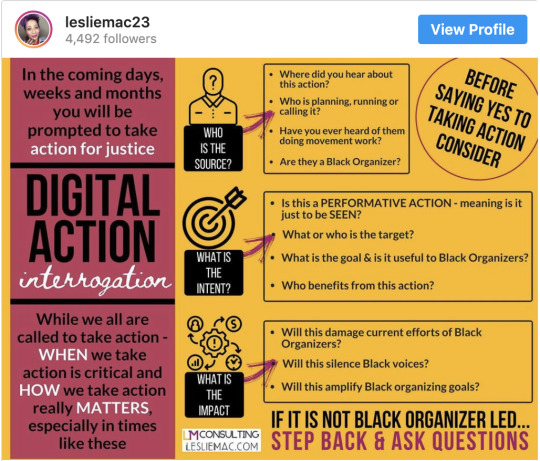
On the other hand, I don’t want to dismiss performative allyship entirely. Being a bad ally or an uninformed ally is better than doing nothing at all, and the fear of not being a “good ally” has prevented a lot of people from engaging with difficult topics at all. If we expect ideological purity from each and every person involved in a movement, we risk alienating everyone. One of the reasons Black Lives Matter blew up this time around was because of all of the performative allyship on social media. It blew up because of all of the people who felt peer pressure to engage, who were desperate for other people to know that they care.
Even among performative allies, the conversation is becoming so much more nuanced than it was just a few years ago. In 2015, the extent of performative allyship was Tweeting that “black lives matter” and then leaving the issue there. Now, even the most performative of allies are linking to resources where you can educate yourself, sign petitions, donate money, volunteer, contact your representatives, and protest. That’s huge. Even if people are entering the journey of allyship for the wrong reasons, by calling them in, we can help them understand what they’re doing wrong and what they could do differently.
So. Keep being part of this movement when the praise is gone. When everyone else on social media has forgotten they cared, keep fighting. Donate. Challenge racist views in your family and in your friend groups. Challenge the racist views that you yourself hold, because you hold some of them. Educate yourself. Protest, or make care packages for the protestors. Sign petitions. Volunteer. Contact your representatives to demand justice, reform, and the freedom of people who were arrested for protesting. Spam police watchdog cameras with videos of your favorite K-pop stars. Use your position of privilege to benefit those who don’t have it. And yes, post on social media. Spreading information and keeping people energized is crucial. But make sure you’re doing it in a way that centers Black movements and Black voices. White people can opt out of caring about police brutality. But POC, and especially Black POCs, cannot. As allies, we have to be here 24/7, 365 days a year, until this problem is fixed. Be a true ally, and don’t let this movement die.
There’s a great article on performative allyship by Holiday Phillips for Forge that I would highly recommend for further reading. You can find it here.
8 notes
·
View notes
Text
"It's hard to feel internally validated if your internal opinion is hard to trust. Doesn't it make perfect sense you would then seek this externally?"
- Seerut K. Chawla
2 notes
·
View notes
Text
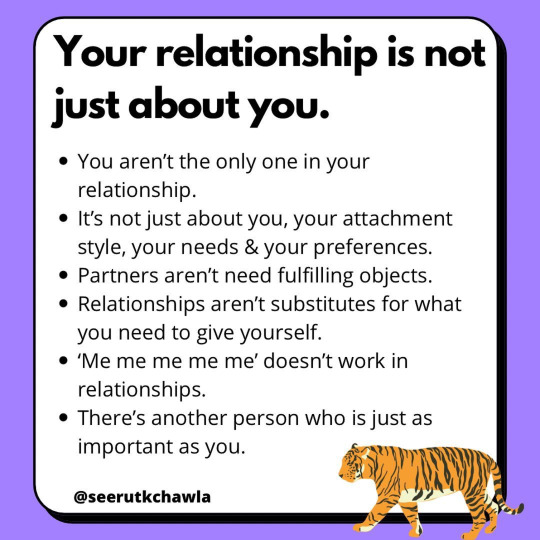
seerutkchawla ~ Instagram
#seerutkchawla#Seerut K Chawla#reciprocity#love#relationship#healthy relationship#unhealthy relationship#conscious relationship#conscious couple#conscious partner#relationship skills#relationship advice#dating advice#healthy boundaries#attachment style#relationship needs#getting needs met
443 notes
·
View notes
